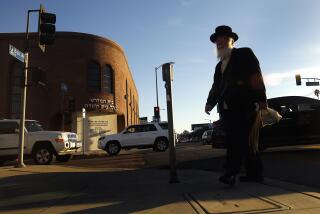Blacks, Jews Work on Rift Caused by Farrakhan : Rabbis, Ministers Seek Links Between Synagogues, Churches to Avoid Crises
- Share via
In the aftermath of Jewish-black discord sparked by black Muslim leader Louis Farrakhan’s recent speech in Los Angeles, a number of black pastors and rabbis are trying to develop firmer bonds between communities that have cooperated intermittently since the civil rights period of the 1960s.
“We have no business apart,” said the Rev. Cecil (Chip) Murray, pastor of the First African Methodist Episcopal Church. “If you combined the wisdom of the Jewish and black communities, you would have a textbook on not only how to survive but also how to overcome anything negative that can happen to a people.”
Clergy from both communities played a prominent role in the controversy that unfolded before and after Farrakhan’s Sept. 14 speech. Jewish leaders said the head of the separatist Nation of Islam should be disavowed as anti-Semitic, and many black leaders, including Mayor Tom Bradley, said Farrakhan should not be denounced prior to his speech.
‘Currents of Anti-Semitism’
Bradley said he hoped, through negotiations and public silence, to moderate Farrakhan’s tone, but the mayor conceded later that the speech “contained strong, dangerous currents of anti-Semitism.”
Rabbinical and pastoral voices are also attempting to repair the damage. Rabbi Harold M. Schulweis, in a recent issue of the Jewish Community Bulletin, wrote that Bradley, right or wrong, is a proven friend of the Jewish community and was consistent in his “irenic,” or calm and diplomatic, style of governing a city of diverse cultures and faiths. “We are too quick to relegate the entire black community to the dust bin of anti-Semitism,” Schulweis said.
Rabbi Isaiah Zeldin of Stephen S. Wise Temple, one of the largest U.S. synagogues, has been in the forefront of organizing face-to-face discussions.
Pulpit exchanges are planned by at least 10 pairs of synagogues and churches around the anniversary of Martin Luther King Jr.’s birthday Jan. 15.
Zeldin will preach Jan. 19 before a Watts congregation, Praises of Zion Baptist Church.
‘Goes Back a Long Way’
“The (black-Jewish) dialogue goes back a long way, but this is the first time we’ve had a rabbi come to preach here in the 30 years I’ve been here,” said the Rev. Joseph Hardwick, pastor of the 1,800-member church. Hardwick will speak at the Friday night service Jan. 17 at the hillside synagogue near the San Diego Freeway.
Stephen S. Wise Temple members recently collected donations for a rummage sale at Praises of Zion Baptist Church, which hopes to furnish a nursery school with the proceeds. “We have 30 students and a waiting list of 30 more but no furniture,” Hardwick said.
Zeldin, whose Reform temple has 2,600 member families, said he hopes the good will extends beyond the King birthday celebrations.
“Out of these pulpit exchanges we hope that covenant relationships will emerge between individual churches and synagogues,” the rabbi said.
The precedent for a “covenant,” or sister-congregation, relationship has already been established by Wilshire Boulevard Temple and Second Baptist Church--the legacy of Rabbi Emeritus Alfred Wolf and soon-to-retire Pastor Thomas Kilgore.
“We participated in a model seder for Passover there last spring,” Kilgore said. The pastor also said groups from each congregation are holding a series of discussions centered on the ministry of King, the slain civil rights leader, to be followed by a joint service.
“We are simply affirming that we are all God’s children,” Kilgore said, “in order to allay some of the fears associated with the visit of Mr. Farrakhan, some of which were groundless and looked upon in the black community as a passing thing.”
Kilgore added: “We must be stable enough in our relationships to deal with eruptions like the Farrakhan thing with the least amount of emotion.”
Kilgore and Wolf co-chair the religious committee of the Mayor’s Commission on Black-Jewish Relationships. The commission also has separate committees on youth and on economic cooperation. Kilgore said he thought there had been interest in the commission for at least two years, but some clergy said the black-Jewish dialogue was dormant before the Farrakhan dispute.
“Contacts were ignored to a large extent. We kept our own distance,” Murray said. Even now, the pastor added, “the response (in the black community) to establishing relationships is mixed because the Jewish question is not the only question facing the black minority.”
He said Korean and black churches are also arranging pulpit exchanges and other visits in an attempt to alleviate tensions prompted by the growing Korean ownership of small businesses in black neighborhoods and their sometimes clashing cultures.
Murray and Rabbi Robert T. Gan of Temple Isaiah plan to speak to each other’s congregations the weekend of Jan. 24-26.
Gan said creating such a program was easier for some rabbis and pastors because of previous links, such as Clergy United for Prophetic Action, which were formed at the time of the mandatory busing program in Los Angeles city schools.
“Because of that kind of association we were able to pick up the phone and say, ‘We ought to talk about this,’ ” Gan said.
Kilgore noted that not all synagogues and churches see the need to participate in such exchanges. “We have to have people with a pretty broad view of what human relations is all about,” he said.
Organizers of the black-Jewish programs hope to persuade the ministerial and rabbinical leaders that the dialogue is worthwhile. Zeldin said he is trying to put together a 24-hour retreat in February for 40 rabbis and pastors at the hilltop summer camp owned by Wilshire Boulevard Temple.
More to Read
Sign up for Essential California
The most important California stories and recommendations in your inbox every morning.
You may occasionally receive promotional content from the Los Angeles Times.













